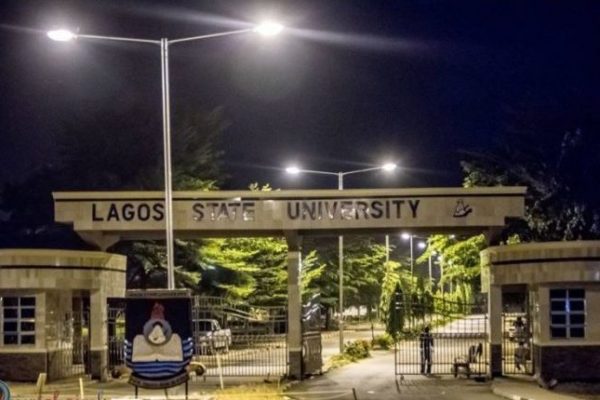LASU partners CSE, India on Data Development in Nigeria

Bothered by the seemingly dearth of data and inappropriate data management which has hitherto bedeviled developmental planning in Nigeria and Africa, Indian-based think tank, the Centre for Science and Environment (CSE), has partnered with the Lagos State University, School of Communication (LASUSOC), on Data Development and Management.
Against this backdrop, the university and the CSE collaborated to organise a 3-day Skills Development Workshop tagged: “African Workshop on How to Use Data for Strategic Communication in Development.”
The event which held between December 13-15, 2016, at the university’s School of Transport, saw no fewer than 60 participants from across diverse professional backgrounds, including journalists, members of the civil society, academics, Non-Governmental Organisations, corporate organisations, media trainers, civil servants, as well as government functionaries, trained on data management.
This is even as LASU and the CSE agreed to exchange expertise and experiences in the fields of development communication, journalism and data science. In his opening remarks at the 3-day workshop, the university’s Vice Chancellor, Prof. Olanrewaju Fagbohun, identified lack of appropriate data as the bane of development in Africa, stating that it often impedes effective development planning in the continent. Professor Fagbohun, who expressed delight in the theme of the workshop noted that its focus on Africa addresses the peculiarities of data gathering and dissemination within the African context. Also speaking at the event, Dean, LASU School of Communication, Prof. Rotimi Olatunji reiterated the importance of data to the “formulation and execution of development programmes.”
Olatunji noted that the availability of appropriate and reliable data often “provide the bases for creative solutions to societal challenges.” While commending the CSE for its collaboration with the School, the don expressed optimism that the “partnership will continue to positively impact both scholarship and development efforts in the two countries.”
“The Memorandum of Understanding is the first step towards a meaningful association between the two countries and lays the foundation for a data revolution which will mutually benefit them to develop in every sphere,” said the Director, CSE’s Indian Environment Portal, Kiran Pandey. On the benefits of the agreement, Pandey said,
“The potential is immense. Both India and Nigeria face similar challenges and this is one of the first attempts to provide a platform for the people who are engaged in the important role of nation building in the two countries.
“The reason we wanted to partner LASU is because the university is the right place to reach out with the young minds who will play a major role in the nation building in the future.” “The success of the first workshop shows the great potential in the field of data. We hope to establish a community of data divers who work together to make the government more transparent and accountable,” she added. On his part, Rajit Sengupta of CSE’s Down to Earth magazine and a trainer at the workshop said: “Our magazine, Down to Earth, has been using data and stories to highlight challenges and successes in the fields of environment and development for the past 25years in India. The workshop is an attempt to share our learnings and experiences.”
However, speaking to journalists at the end of the workshop, yesterday, the Sub-Dean, LASU School of Communication, Dr. Suraj Olunifesi Adekunle said: “We have seen that Africa is backward for a number of reasons and most of the reasons are due to data. “We have come to an age where if you don’t have a tab on your data you can’t actually advance in developmental projects. We have seen the UN Millennium Development Goals (MDGs) and Africa was not able to meet up.
“Now, we are talking about the Sustainable Development Goals (SDGs), and Africa may not meet up. The reason is because Africa does not keep data. We don’t keep data. We rely on foreign data. Whatever foreign organisations tell us is what we accept. That’s why most of the advice by the International Monetary Fund (IMF), World Bank among others are not applicable to Africa because it’s not based on data generation.
“Take Nigeria for instance, how much crude oil are we taking out of the country over the years? Nobody could tell you. We rely so much on the statistics reeled out by foreign oil experts. There was a time in this country the Inspector General of Police was asked about the total number of policemen in the country, he could not state the exact number.
“So, we have seen that we can’t run effectively without data, we have seen that we can’t have a good policy for development without data. We can’t continue this way. Even this current biting recession could be tackled with adequate data as it would help curtail the waste in the system.”
He added that “We need to close this gap because the world is moving, but Africa is left behind. The only way to get it right is to start with data management. Once we are able to know where to source for data, how to get data and how to keep data, then, we can be able to plan effectively. We can be able to plan our resources, human expertise, and get development on the agenda. “Having said this, we said let us look for people who are in the vanguard of doing this, so, we settled for an NGO in India, Centre for Science and Environment (CSE).
The CSE is not government owned and they are not externally influenced. The CSE has this developmental approach and they have been doing it over time. Having seen their works in Africa, over the years, we said these are the best people to partner with.”









0 Comments